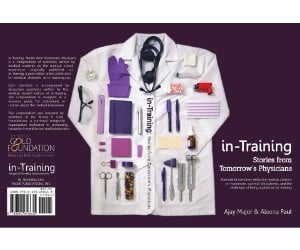Last Updated on June 26, 2022 by Laura Turner
In early 2012, medical students Ajay Major and Aleena Paul started in-Training.org, a website dedicated to the medical student community at large with a goal—according to the site—to become “the intellectual center for news, commentary, and the free expression of the medical student voice.” Since then, the site has grown by leaps and bounds, recently celebrating their 1000th article publication. Four years after the launch of the website, Major and Paul—who are now beginning their residency training—compiled around 100 of these essays into a book: in-Training: Stories from Tomorrow’s Physicians.
The book is broken down into topical sections of essays and poems discussing all aspects of the medical student experience. The focus of these large chapters ranges from that first day in the cadaver lab, to the learning curve that comes with beginning med school, to burnout, global health, and feeling like a physician. Easy essay is brief—no more than a couple of pages—and includes three to four discussion or reflection questions compiled by the book’s team of medical student editors.
The essays in the volume are as diverse as the students who wrote them. Some focus on lessons learned about medicine in unexpected ways. For example, one author describes how a newly-discovered passion for photography taught her to “listen with her eyes” in a way that will forever impact her interaction with her patients. Others discuss how medicine interacts with current events, as in the essay “A Lack of Care: Why Medical Students Should Focus on Ferguson,” which discusses how culturally-ingrained racial biases affect healthcare. Many are reflections on personal experiences in medical school, including a number of essays and poems focusing on students’ time with their “first patient” in the anatomy lab.
While the essays are written primarily by and for medical students, this collection would also be a good read for premeds and residents. Even family members of those in medical education could benefit from reading the book, as it provides a window into the mysterious world their loved one has entered. Medical school is an experience like no other, and it’s not always an easy one to process. This collection is a valuable resource for students who may feel alone in some of the challenges they face while they learn to navigate the complicated world of healthcare. There is something profoundly powerful about reading what someone else is feeling and thinking, “me too.”
I truly enjoyed reading the works in this collection. The essays do a good job, both for the writer and the reader, of providing an outlet to process the experience of medical school and working in healthcare. Overall the writing is filled with hope for the future of medicine the writers will participate in, and I finished feeling encouraged about the next generation of physicians as they enter the challenging and complicated world of modern healthcare. I was also pleasantly surprised to discover how much I enjoyed the discussion questions at the end of each piece. They were well thought out, and truly applicable to the medical student working to become the best possible physician. Whether used for group discussion purposes or just for personal reflection, the questions add significantly to the value of the book as a resource for medical students and educators.
This book is one better consumed in small doses rather than read all at once. When taken all together, the essays begin to lose some of their significance and can feel repetitive and tiresome. Writing quality varies a bit from essay to essay. While most are very good, some oversimplify complex issues, or feel like they are trying too hard to connect with the audience or sell some profound message. The volume as a whole is on the serious side, making the reading experience a bit of a downer at times. As a book of writings intended to help medical students process the experience of medical education, it makes sense that topics covered would be more solemn. However, it can make for heavy reading at times.
Tomorrow’s physicians have much to benefit from reading this collection of writing from their peers and from working through the discussion questions. Still, I hope that as they learn and advance through their medical training that they will learn not only to treat their patients thoughtfully, but with a smile and a good sense of humor as well.
We’ve been on the Internet for over 20 years doing just one thing: providing health career information for free or at cost. We do this because we believe that the health education process is too expensive and too competitive. Many people and organizations have built their businesses making money on students who are desperate for any opportunity to become a doctor.
We believe that all students deserve the same access to high-quality information. We believe that providing high-quality career advice and information ensures that everyone, regardless of income or privilege, has a chance to achieve their dream of being a doctor.
SDN is published by the Health Professional Student Association, a nonprofit educational organization.


